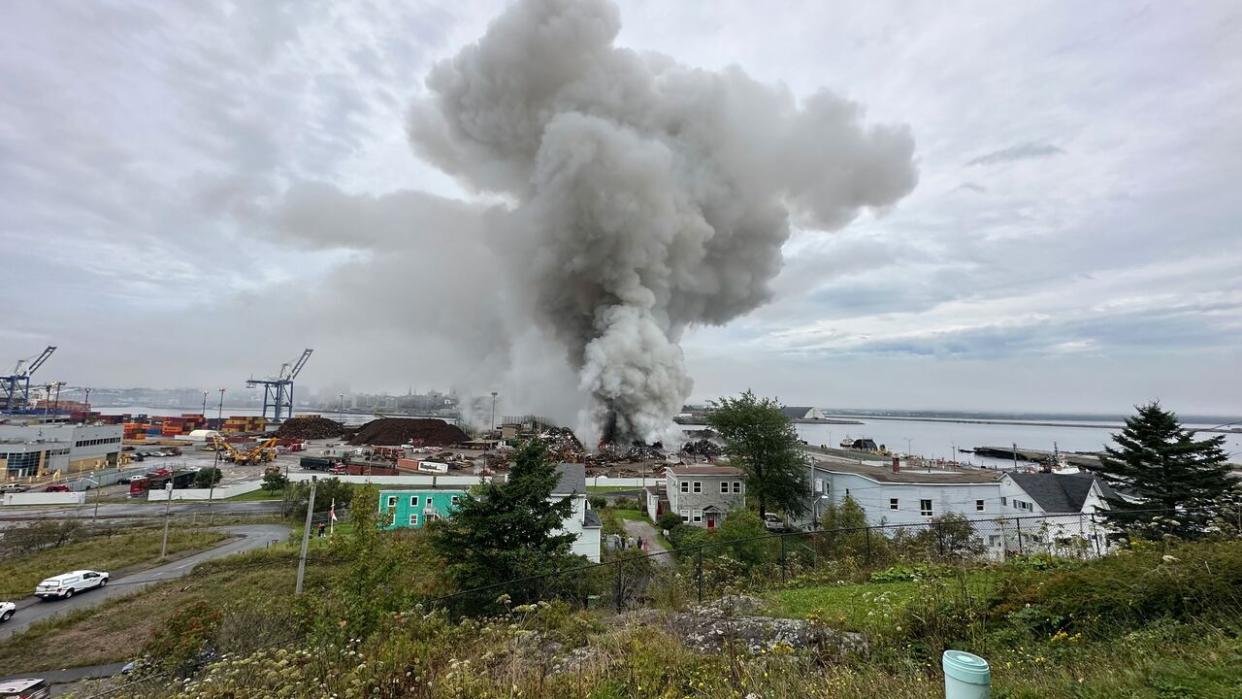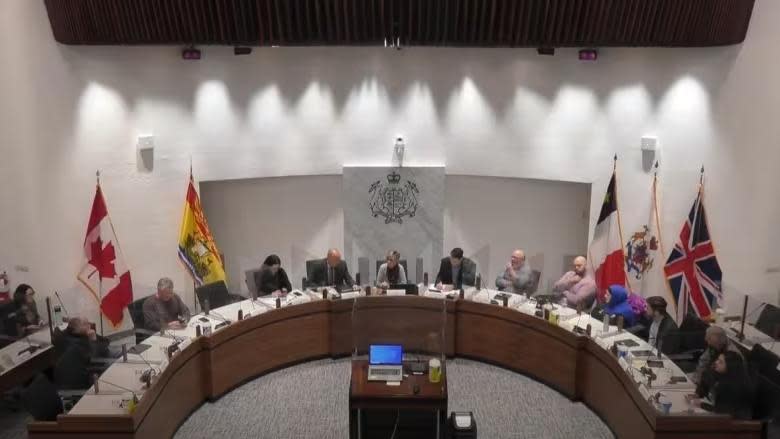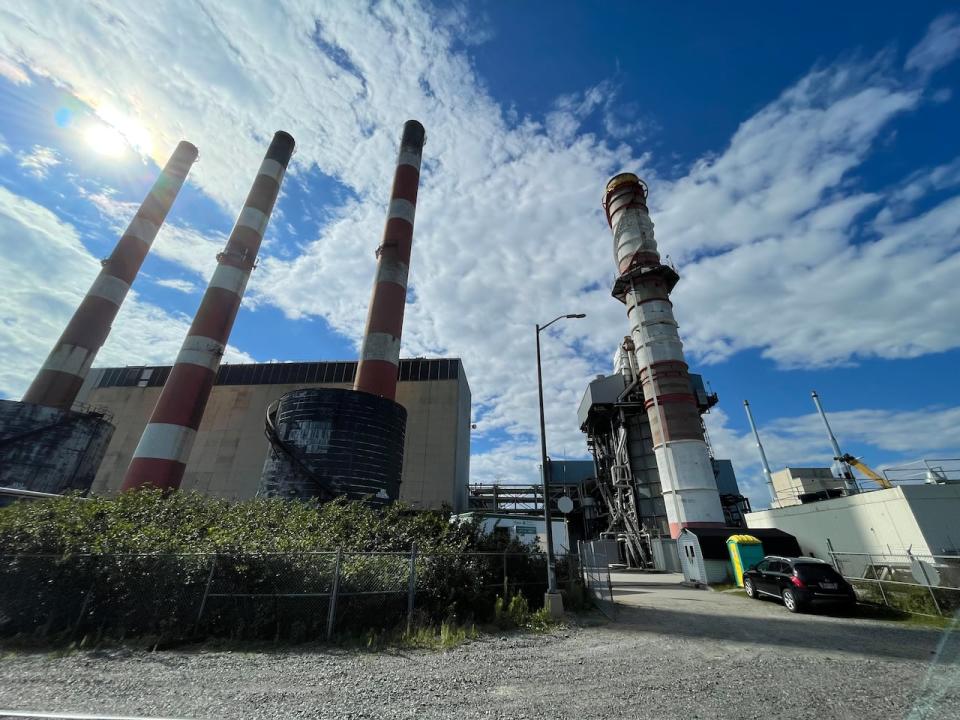Controversial Saint John metal recycling operation wins property tax cut

The controversial scrap-metal shredding and export site in Saint John that was at the centre of a major two-day fire last year is in line for a 5.8 per cent reduction in its municipal property tax bill in 2024. It comes following a $183,100 assessment reduction granted by Service New Brunswick last week.
The reduction is in sharp contrast to most neighbours of American Iron and Metal who will be paying more for city services this year than last year.
"It's incredible," said Bryan Wilson, one of those neighbours who doesn't like that contrast.
Wilson's own property assessment, like almost all of his neighbours, is up more than 30 per cent in 2024 because of rising real estate values.

Bryan Wilson has lived in a neighbourhood close to the AIM scrap-metal operation since 2019 and isn't pleased its property tax bill is going down in 2024. (Robert Jones/CBC)
He lives within a kilometre of the scrap-metal business and has experienced many of the 20 fires and 140 explosions documented at the site since 2017. He believes whatever assessment formulas and property tax rules that have residents paying more in 2024, and the AIM property paying less, need to be addressed.
"Some of the residents I know would be deeply upset by AIM getting anything that looks like a discount," said Wilson.
Property tax bills will not be issued by the province for another five weeks but in Saint John property assessment notices, upon which bills are based, have already made it clear the city's tax burden is shifting onto residential property owners more than in the past.
Part of that is driven by modest growth in assessed values given to business properties by Service New Brunswick for 2024, in comparison to large increases on residential properties.
But an equally significant factor is that provincial property tax rules restrict municipalities from moving tax rates for business and residents independently of one another to offset assessment differences.
Service New Brunswick will not discuss details of values it assigns to business properties even though a number of those issued in Saint John for 2024, including to AIM, are resulting in reduced revenues to the city that residential property owners are having to replace.
That is galling to Wilson, who said after last summer's two-day-long scrap-metal fire in his neighbourhood, he doesn't want to think even a bit of the increased property tax from him will be used to replace lower taxes for the AIM facility.
"It's really just another insult that says after what you just went through in September, and what you've been going through for 10 years, we're going to give them a discount?"
Last year, with residential assessments rising rapidly, the New Brunswick government did lift the limit municipalities can charge business properties, from 150 per cent of the residential tax rate to 170 per cent.

Saint John council has asked the province for more authority to raise industrial tax rates above current limits. (City of Saint John/YouTube)
That was meant to help municipalities level property tax increases between household properties facing large assessment increases and business properties that weren't.
But with residential assessments up significantly again this year, the province has declined to raise the limit on business property tax rates any further, despite requests from Saint John and other municipalities.
That decision has been applauded by business.
Ron Marcolin is the divisional vice-president for New Brunswick with the Canadian Manufacturers and Exporters organization. He said business property owners already pay substantially higher rates than residential owners.
He said industry is open to changes being discussed, but is wary of giving municipalities free reign to raise and lower property tax rates without restriction.
"Industry is happy to have a review but certainly not at the cost of industry where there are no limits," said Marcolin
"That's clearly not realistic."
With Saint John unable to raise industrial property tax rates further in 2024, a number of industrial properties in the city have assessments low enough to pay reduced municipal property taxes from last year.
In addition to AIM metal recycling, they include the Irving Oil Refinery, the Canaport crude-oil tank farm and various oil pipelines, Repsol's LNG facility, J.D. Irving Ltd.'s paper mill, wallboard plant and tissue mill, the Moosehead brewery and both of N.B. Power's Saint John generating stations.

The Bayside natural gas generating station recently underwent a $70-million refurbishment with the installation of a new turbine. Nevertheless, its assessed value for 2024 by Service New Brunswick dropped by 9.5 per cent. (Robert Jones/CBC)
That includes N.B. Power's Bayside natural gas generating station, which underwent a $70 million refit in 2022 and 2023 with the installation of a new turbine and still had its assessment lowered $1.6 million —9.5 per cent — by Service New Brunswick.
That will cost Saint John $54,000 in reduced revenue.
In an emailed statement, New Brunswick's Department of Local Government said property tax rules for municipalities are under review and changes, in the future, are possible.
"Government will continue discussions on possibilities of providing more flexibility to set different tax rates," said the statement.


